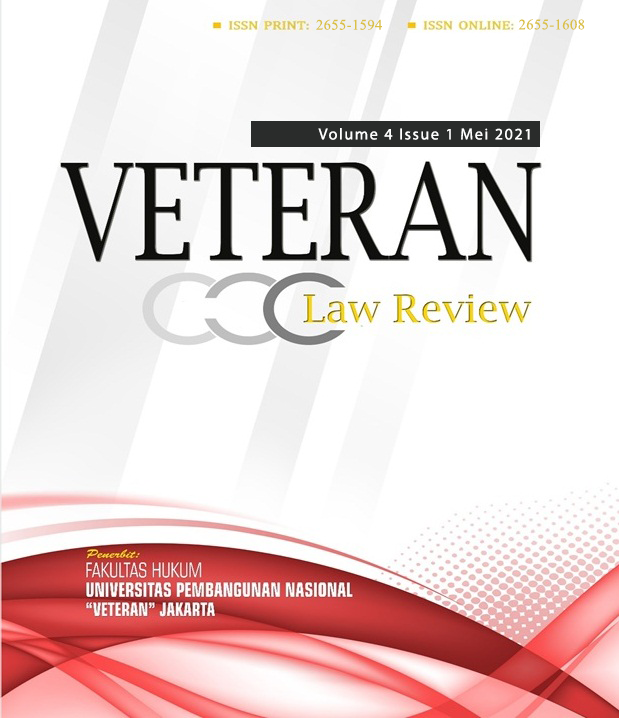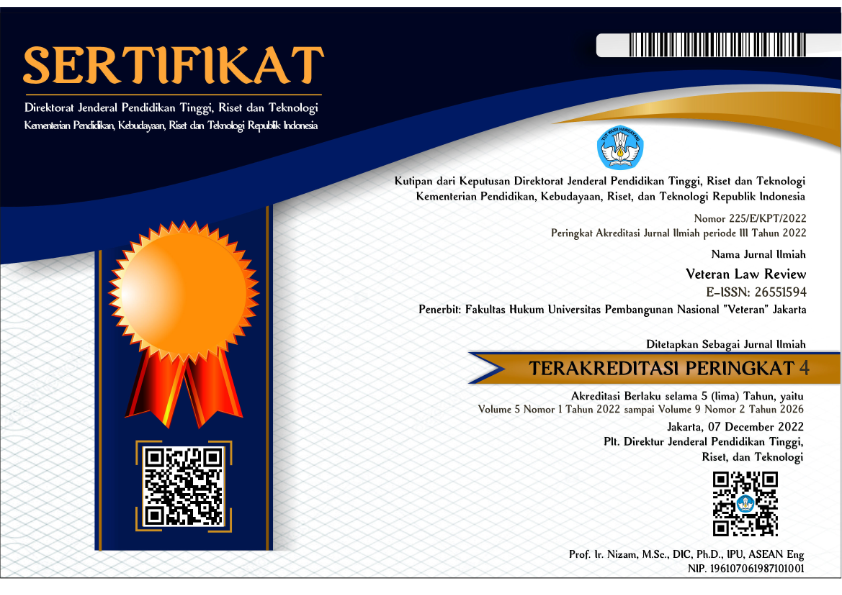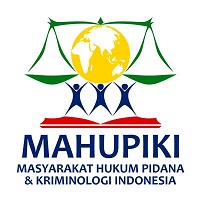Plantation Regulation In The Palm Industry Sector In The Omnibus Law Of Employment Creation (Cipta Kerja)
DOI:
https://doi.org/10.35586/velrev.v4i1.2750Abstract
The ratification of Law Number 11 of 2020 concerning Employment Creation (Omnibus Law Employment Creation) massively amends, deletes, or sets new rules against several previous laws, such as Law Number 39 of 2014 concerning Plantations (Plantation Law) and other regulations. Some of the contradictions that have arisen between the Plantation Law and the Omnibus Law Employment Creation, of course, have an influence on the palm oil industry sector in Indonesia, causing legal uncertainty. The problem raised in this study is about how the plantation regulation in the palm oil industry sector is in the Omnibus Law Employment Creation. The research objective is to analyze the legal certainty of plantation regulations in the palm oil industry sector in the Omnibus Law Employment Creation. The research method used is juridical normative, that is, research is carried out through literature study with secondary data. The results show that the plantation regulations in the palm oil industry sector in the Omnibus Law Employment Creation contain legal uncertainty, where in the Omnibus Law Employment Creation there are several contradictions with the provisions of the previous Plantation Law, such as the culture of prioritizing foreign investors, and not in accordance with protection and management of environment. It is necessary to review laws and regulations, especially for the sustainability of the palm oil industry sector, by harmonizing all the rules contained in the Omnibus Law Employment Creation.Downloads
References
Constitution of the Republic of Indonesia.
Law of the Republic of Indonesia Number 11 Year 2020 concerning Job Creation, State Gazette of the Republic of Indonesia Year 2020 Number 245, Supplement to State Gazette of the Republic of Indonesia Number 6573.
Law of the Republic of Indonesia Number 39 Year 2014 concerning Plantations, State Gazette of the Republic of Indonesia Year 2014 Number 308, Supplement to the State Gazette of the Republic of Indonesia Number 5613.
Law of the Republic of Indonesia Number 23 Year 2014 concerning Regional Government, State Gazette of the Republic of Indonesia Year 2014 Number 244, Supplement to the State Gazette of the Republic of Indonesia Number 5587.
Law of the Republic of Indonesia Number 32 Year 2009 concerning Protection and Management of the Environment, State Gazette of the Republic of Indonesia Year 2009 Number 140, Supplement to the State Gazette of the Republic of Indonesia Number 5059.
Law of the Republic of Indonesia Number 25 Year 2007 concerning Investment, State Gazette of the Republic of Indonesia Year 2007 Number 67, Supplement to the State Gazette of the Republic of Indonesia Number 4724.
Academic Paper on Omnibus Bill Employment Creation.
A. Jimly. (2015), Indonesian Constitution & Constitutionalism, Second Edition, Sinar Grafika, Jakarta.
A., Jimly. (2015), Introduction to Constitutional Law, Rajawali Pers, Jakarta.
Daliyo, J.B., et.al., (2001), Introduction to Indonesian Law, Prenhallindo, Jakarta.
Garner, B. A. (Ed.)., (2009) Black’s Law Dictionary, Minnesota, West Publishing Co.
Harsono, B., (2008), Indonesian Agrarian Law, Revisited Edition, Djambatan, Jakarta.
Ishaq, (2017), Legal Research Methods and Writing Thesis, Thesis, and Dissertation, Alfabeta, Bandung.
Manullang, E. F. M. (2016). Legism, Legality and Legal Certainty. Kencana Prenadamedia Group, Jakarta.
Marzuki, P. M., (2009), Legal Research, Kencana, Jakarta.
Purbacaraka, P., & Soekanto, S., (1993), Regarding Legal Rule, Citra Aditya Bakti, Bandung.
Soekanto, S., & Mamudji, S., (2001), Normative Legal Research A Brief Overview, Jakarta, PT Raja Grafindo Persada.
Sunggono, B., (1998), Legal Research Methodology, Raja grafindo Persada, Jakarta.
Syarbani, S., & Rusdiyanta (Ed.), (2010), Implementation of Pancasila through Citizenship Education, Graha Ilmu, Yogyakarta.
Gluck, A. R., O’Connell, A. J., Po, R. (2015). Unorthodox Lawmaking, Unorthodox Rulemaking, Columbia Law Review. 115(7). Retrieved from https://columbialawreview.org/content/unorthodox-lawmaking-unorthodox-rulemaking/.
Aedi, A. U., Lazuardi, S., Putri, D. C. (2020). Architecture of Application of Omnibus Law through Transplantation of National Laws of Law Establishment, Journal of Ilmiah Kebijakan Hukum. 14 (1). doi: https://dx.doi.org/10.30641/kebijakan.2020.V14.1-18.
Dharmawan, A. H., Nasdian, F. T., Barus, Baba., Kinseng, R. A., Indaryanti, Y., Indriana, H., Mardianingsih, D. I., Rahmadian, F., Hidayati, H. N., Roslinawati, A. M. (2019). Readiness of Independent Oil Palm Smallholders in Implementing ISPO: Environmental Issues, Legality and Sustainability. Journal of Ilmu Lingkungan. 17(2).
Petrenko, C., Paltseva, J., Searle, S. (2016). Ecological Impacts of Palm Oil Expansion in Indonesia. White Paper. The International Council on Clean Transportation. Retrieved from https://theicct.org/sites/default/files/publications/Indonesia-palm-oil-expansion_ICCT_july2016.pd.
Wilcove, D. S., & Koh, L. P. (2010). Addressing the Threats to Biodiversity from Oil-palm Agriculture, Biodiversity and Conservation. 19(4). 999–1007. doi:10.1007/s10531-009-9760-x.
Erman, E. (2017). Behind Palm Oil Sustainability: Actors, Alliance in European Union Certification Political Economy. Indonesian Society. Journal of Ilmu-ilmu Sosial Indonesia. 43 (1). doi: https://doi.org/10.14203/jmi.v43i1.751.
Indrapraja, F. M. (2018). Analysis of the Certification of Sustainable Palm Oil as an Instrument for Organizing Environmental Laws. Journal of Hukum Lingkungan. 4(2). Retreieved from https://jhli.icel.or.id/index.php/jhli/article/view/61/62.
Moho, H. (2019). Law Enforcement in Indonesia according to the Aspects of Legal Certainty, Justice and Benefit. Journal of Warta. 13(1). doi: https://doi.org/10.46576/wdw.v0i59.349.
Leawoods, H. (2000). Gustav Radbruch: An Extraordinary Legal Philosopher. Washington University Journal of Law & Policy. 2(489). Retrieved from https://openscholarship.wustl.edu/cgi/viewcontent.cgi?article=1516&context=law_journal_law_policy.
Braithwaite, J. (2002). Rules and Principles: A Theory of Legal Certainty. SSRN Electronic Journal. doi: 10.2139/ssrn.329400.
Benuf, K. & Azhar, M. (2020). Legal Research Methodology as an Instrument for Unraveling Contempore Legal Problems, Journal of Gema Keadilan. 7(1). doi: https://doi.org/10.14710/gk.7.1.20-33.
Massicotte, L. (2013). Omnibus Bills in Theory and Practice, Canadian Parliamentary Review. 36(1). Retreived from http://revparl.ca/36/1/36n1_13e_Massicotte.pdf.
Rosenfeld, M., & Sajo A. (Ed.). (2012). The Oxford Handbook of Comparative Constitutional Law. Oxford University Press. doi: 10.1093/oxfordhb/9780199578610.013.0012.
Agustira, M. A., Amalia, R., Nurkhoiry, R. (2015). Palm Oil Program for the People (Prowitra) as an Effort to Increase Productivity, Empowerment, Sustainability and Welfare of Smallholder Oil Palm Planters, Proceeding National Seminar “Perlindungan dan Pemberdayaan Pertanian dalam Rangka Pencapaian Kemandirian Pangan Nasional dan Peningkatan Kesejahteraan Petani”. Retrieved from http://pse.litbang.pertanian.go.id/ind/pdffiles/prosiding_2016/3_5.pdf.
Ngadi & Noveria, M. (2017). Sustainability of Oil Palm Plantations in Indonesia and Development Prospects in Border Areas, Indonesian Communities. Journal of Ilmu-ilmu Sosial Indonesia. 43(1). doi: https://doi.org/10.14203/jmi.v43i1.716.
Schofield, P. (2013). The Legal and Political Legacy of Jeremy Bentham. Annual Review of Law and Social Science. 9(1). doi: 10.1146/annurev-lawsocsci-102612-134101.
Corley, R.H.V. (2009). How much palm oil do we need? Environmental Science & Policy. 12(2). doi: 10.1016/j.envsci.2008.10.011.
Khatun, R., Reza, M. I. H., Moniruzzaman, M., Yaakob, Z. (2017). Sustainable oil palm industry: The possibilities. Renewable and Sustainable Energy Reviews. 76. 608–619. doi: 10.1016/j.rser.2017.03.077.
Anggraeni, Risca., & Rachman, C. I. L. (2020). Omnibus Law in Indonesia: Is That the Right Strategy? Proceedings of International Conference on Law, Economics, and Health (ICLEH). 140. doi: https://doi.org/10.2991/aebmr.k.200513.038.
Alexy, R. (2015). Legal Certainty and Correctness. Ratio Juris. 28(4). doi: 10.1111/raju.12096.
Hutabarat, S. (2017). Challenges for the Sustainability of Smallholder Oil Palm Planters in Pelalawan District, Riau in Changing Global Trade. 43(1). Masyarakat Indonesia. Journal of Ilmu-ilmu Sosial Indonesia. doi: https://doi.org/10.14203/jmi.v43i1.713.
Hasibuan, S., & Thaheer, H. (2017). Life Cycle Impact Assessment of Palm Biodiesel Production to Support the Sustainable Downstreaming of the Indonesian Palm Oil Industry, National Seminar of Inovasi dan Aplikasi Teknologi di Industri.
American Chamber of Commerce in Indonesia. Peter Sean Lie (Ed.). (2020). Omnibus Bills: How do they Work? Retrieved on February 11th 2021 from https://www.amcham.or.id/en/news/detail/omnibus-bills-how-do-they-work-.
BBC News Indonesia. (2020). The contents of the Omnibus Law: The final document of the Job Creation Law cannot yet be accessed by the public, experts are worried about "the entry of contraband articles." Retreived on February 11th 2021 from https://www.bbc.com/indonesia/indonesia-54501112#:~:text=Undang%2DUndang%20Omnibus%20Law%20Cipta%20Kerja%20berisi%2011%20klaster%20yang,persyaratan%20investasi%2C%20hingga%20administrasi%20pemerintahan.
Finance.detik.com. (2020). 3 Impact of the Foreign Analyst version of the Omnibus Law on Job Creation. Retrieved on February 11th 2021 from https://finance.detik.com/berita-ekonomi-bisnis/d-5207239/3-dampak-omnibus-law-cipta-kerja-versi-analis-asing.
Gatra.com. Abdul Aziz (Ed.). (2020). Omnibus Law Ratified, Happy Palm Oil Farmers. Retrieved on February 11th 2021) from https://www.gatra.com/detail/news/492203/info-sawit/omnibus-law-disahkan-petani-sawit-sumringah.
Google.com. (2021). Free translation by Google Translate. English to Indonesian. Retrieved from https://www.google.com/search?q=google+translate&rlz=1C1CHBF_enID892ID893&oq=goog&aqs=chrome.2.69i60j69i59l2j69i57j69i60l4.2420j0j7&sourceid=chrome&ie=UTF-8.
Hukumonline.com. Muhammad Yasin (Ed.). (2020). Get to know the "Omnibus Law" method, Retrieved on February 11th 2021 from https://www.hukumonline.com/berita/baca/lt5f7ad4c048f87/mengenal-metode-omnibus-law?page=all.
Infosawit.com. (2020). Improved Governance of Palm Oil "lousy" Due to the Omnibus Law Employment Creation. Retrieved from February 11th 2021 from https://www.infosawit.com/news/10276/perbaikan-tata-kelola-sawit----runyam----akibat-uu-omnibus-law-ciptaker.
Kadin.id. (2020). The Palm Oil Industry Embraces the Implementation of Omnibus Law. Retrieved on February 11th 2021 from https://kadin.id/news-event/news-detail/785/industri-kelapa-sawit-sambut-positif-penerapan-omnibus-law.
Lusia Arumingtyas. (2020). Omnibus Law ‘Smooth Road' Legalizes Oil Palm Investment Violations in Forest Areas? Retrieved on February 11th 2021, www.mongabay.co.id/2020/10/29/omnibus-law-jalan-mulus-legalkan-pelanggaran-investasi-sawit-dalam-kawasan-hutan/#:~:text=Kehadiran%20omnibus%20law%20ini%20bakal,semacam%20pemutihan%20terhadap%20kejahatan%20lingkungan.
Money.kompas.com. Muhammad Idris (Ed.). (2020). Dissecting Concerns about Tenure of Palm Oil in the Job Creation Law. February 11th 2021 from https://money.kompas.com/read/2020/10/18/093716726/membedah-kekhawatiran-penguasaan-lahan-sawit-di-uu-cipta-kerja?page=all.
Parta Setiawan. (2021). Legal Research Methods, Understanding, Kinds, Normative, Empirical, Approaches, Data, Analysis, Experts. Retrieved on February 12th 2021. https://www.gurupendidikan.co.id/metode-penelitian-hukum/.
TribunPalu.com. (2020). Clarissa Fauzany Priastuti, Rizkianingtyas Tiarasari (Ed.). (2020). President Jokowi Describes 6 Positive Impacts of the Omnibus Law on Work for the Business and Investment Climate. Retrieved on diakses 20 November 2020 from https://palu.tribunnews.com/amp/2020/11/20/presiden-jokowi-uraikan-6-dampak-positif-omnibus-law-cipta-kerja-bagi-iklim-usaha-dan-investasi?page=all, (11 Februari).
Downloads
Published
How to Cite
Issue
Section
License
Copyright (c) 2022 Veteran Law Review Journal
Veteran Law Review © 2022 by Faculty of Law Universitas Pembangunan Nasional "Veteran" Jakarta is licensed under Creative Commons Attribution 4.0 International

1. License
The non-commercial use of the article will be governed by the Creative Commons Attribution license as currently displayed on Creative Commons Attribution 4.0 International.
2. Author(s)' Warranties
The author warrants that the article is original, written by the stated author(s), has not been published before, contains no unlawful statements, does not infringe the rights of others, is subject to copyright that is vested exclusively in the author, and free of any third party rights, and that any necessary written permissions to quote from other sources have been obtained by the author(s).
3. User/Public Rights
VELREV's spirit is to disseminate articles published are as free as possible. Under the Creative Commons Attribution-ShareAlike 4.0 International License. VELREV permits users to copy, distribute, display, and perform the work for non-commercial purposes only. Users will also need to attribute authors and VELREV to distributing works in the journal and other media of publications.
4. Rights of Authors
Authors retain all their rights to the published works, such as (but not limited to) the following rights;
- Reproduce the work
- Prepare derivative works based upon the work
- Distribute copies of the work
- Perform the work publicly
- Display the work publicly
- Copyright and other proprietary rights relating to the article, such as patent rights,
- The right to self-archive the article,
- The right to enter into separate, additional contractual arrangements for the non-exclusive distribution of the article's published version (e.g., post it to an institutional repository or publish it in a book), with an acknowledgement of its initial publication in this journal (Veteran Law Review).
5. Co-Authorship
If the article was jointly prepared by more than one author, any author submitting the manuscript warrants that he/she has been authorized by all co-authors to be agreed on this copyright and license notice (agreement) on their behalf, and agrees to inform his/her co-authors of the terms of this policy. VELREV will not be held liable for anything that may arise due to the author's internal dispute. VELREV will only communicate with the corresponding author.
6. Royalties
Being an open accessed journal and disseminating articles for free under the Creative Commons license term mentioned, author(s) are aware that VELREV entitles the author(s) to no royalties or other fees.
7. Miscellaneous
VELREV will publish the article (or have it published) in the journal if the article’s editorial process is successfully completed. JOSI's editors may modify the article to a style of punctuation, spelling, capitalization, referencing, and usage that deems appropriate. The author acknowledges that the article may be published so that it will be publicly accessible and such access will be free of charge for the readers as mentioned in point 3.


















